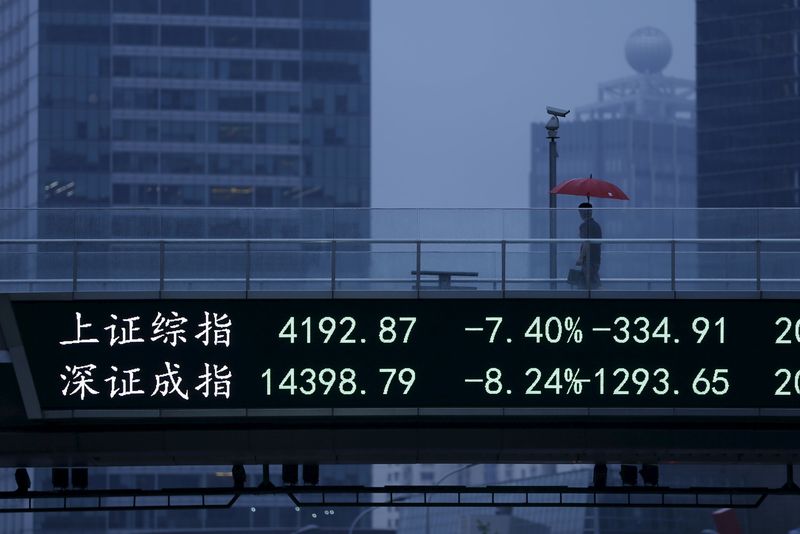By Winni Zhou and David Stanway
SHANGHAI (Reuters) - China's smaller banks and brokers are turning to stock exchanges to borrow short-term cash this week to escape the typical end of June pressure in money markets and more recent worries over credit risks in the sector.
The volume of repurchase agreements on the Shanghai stock exchange, in which banks and other financial firms borrow money from each other using bonds as collateral, surged as borrowers sought an alternative to the over-the-counter interbank money market.
Traders said the lower borrowing costs on the exchange and the less stringent requirements for collateral drove smaller players to the exchange.
"Cost of borrowing on the exchange is lower," said a trader at a Chinese bank in Shanghai.
The interbank markets were affected not just by shortages of cash but also concerns over the quality of the pledged collateral.
Traders said collateral requirements had tightened in the interbank market in the wake of regulators taking over the troubled and credit-laden Inner Mongolia-based Baoshang Bank.
Borrowers could still pledge their corporate bonds on the exchange for repos but lenders in the interbank markets had turned picky.
"It is not just the quarter-end liquidity issue in the interbank market, it's more of a structural conflict. If it is resolved, the cash conditions would be very loose," said a Shanghai-based bond fund manager.
Exchange data showed volumes of 14-day repos traded on the Shanghai Stock Exchange leapt to an all-time high of 208.9 billion yuan ($30.3 billion) on Monday. That compares with a total of 345.7 billion yuan in all of May, but a fraction however of interbank repo volumes.
Traders said demand for 14-day repos was particularly high early this week as non-banking financial institutions rushed to secure funds to tide over the end-June crunch, a period of half-year regulatory requirements.
The cost of 14-day repo funds on the exchange spiked to 3.4% on Monday from average levels around 2.7% in the previous two weeks.
Interbank rates for banks were close at 3.5% on Monday, but traders said the cost was as high as 8% in the over-the-counter broader interbank market that includes non-bank participants. The rate hit 15% at one point last week.
The interbank 14-day rate for all participants hit 6% on Wednesday morning, compared with 3.4% on the exchange.
"Many banks now require non-bank financial institutions to use government bonds or negotiable certificates of deposits NCDs) issued by state-owned companies as collateral, and not all the AAA-rated corporate bonds are accepted," said a second trader at a Chinese bank in Shanghai.
China's securities watchdog has urged large non-bank financial institutions to lend in the interbank market to smaller non-bank firms to help ease any cash shortfalls. The central bank has also injected more cash into the banking system while regulators have repeatedly downplayed the risks at small financial institutions.
Analysts at OCBC Bank said smaller banks and non-bank financial institutions were struggling though, and unable to access funding even though the interbank bank repo market was stable.
A third trader at a Chinese bank in Guangdong province said most banks would sail smoothly through the end of the first-half but some non-bank financial institutions would feel the pain.
"There's no way for those who hold 'rotten' notes to survive the quarter-end this time," the trader said, referring to institutions who hold lower-rated debt.
($1 = 6.9043 Chinese yuan)
